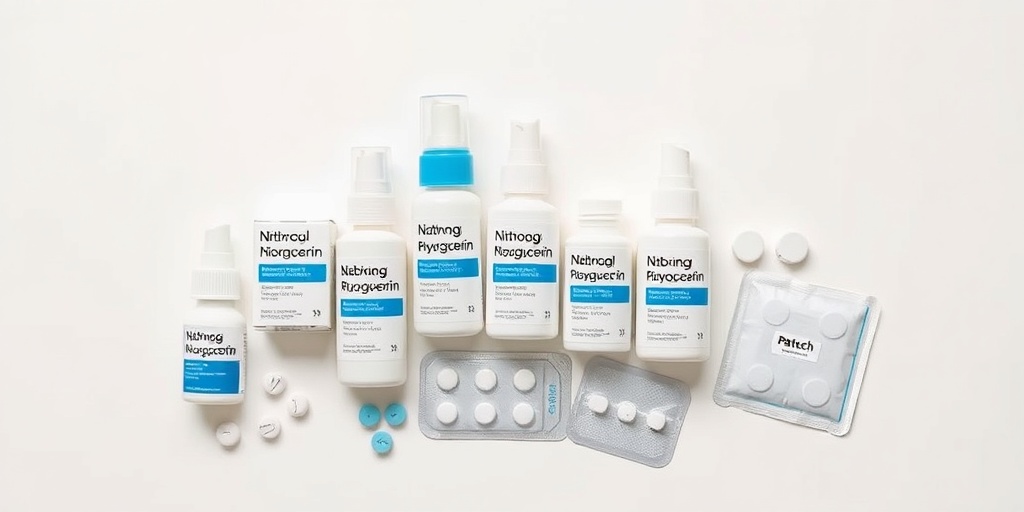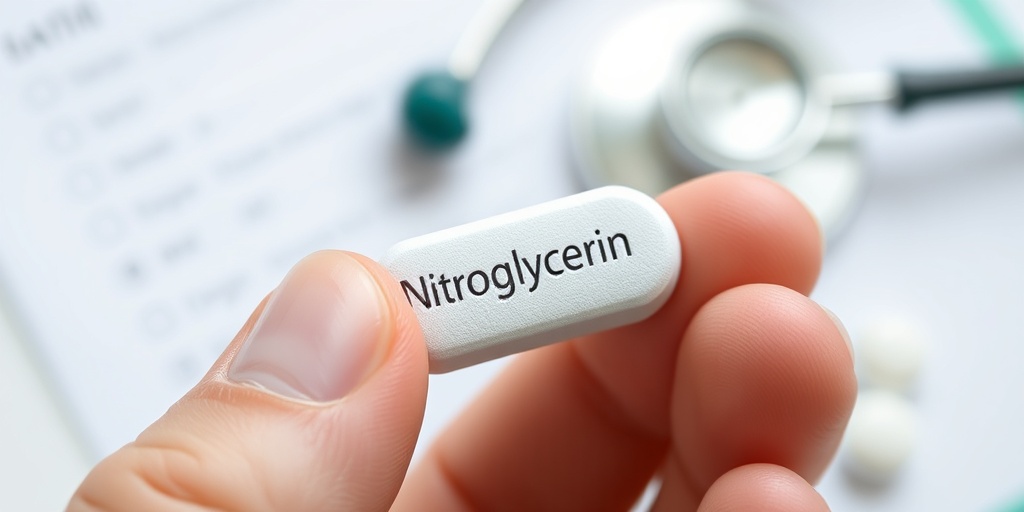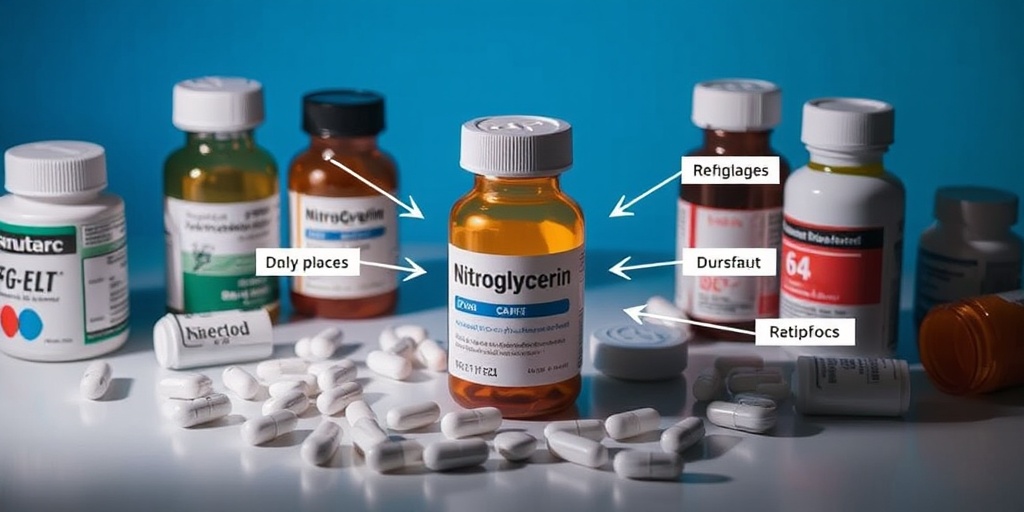What Is Nitroglycerin?
Nitroglycerin is a medication that has been used for over a century to treat various heart conditions. It is primarily known for its role in managing chest pain, particularly in patients with angina pectoris, a type of chest pain caused by reduced blood flow to the heart. Nitroglycerin works by relaxing the blood vessels, allowing for improved blood flow and reducing the heart’s workload.
This medication can be administered in several forms, including tablets, sprays, ointments, patches, and intravenous infusions. Each form has its specific use cases and benefits, making nitroglycerin a versatile option for those experiencing chest pain.
How Does Nitroglycerin Work?
The primary mechanism of action for nitroglycerin involves the conversion of the drug into nitric oxide in the body. This process leads to the relaxation of smooth muscle cells in the blood vessels, resulting in vasodilation. As a result, the heart receives more oxygen-rich blood, alleviating the symptoms of chest pain.
By decreasing the heart’s oxygen demand and increasing the supply, nitroglycerin effectively helps manage angina and other related conditions. However, it is essential to use this medication under medical supervision, as improper use can lead to complications.
Nitroglycerin Uses
Nitroglycerin is primarily used for the treatment of chest pain associated with angina. However, its applications extend beyond just managing angina. Here are some of the key uses of nitroglycerin:
- Angina Pectoris: Nitroglycerin is most commonly prescribed for patients experiencing angina. It helps relieve the pain by improving blood flow to the heart.
- Heart Attack: In some cases, nitroglycerin may be administered during a heart attack to help reduce the heart’s workload and improve blood flow.
- Heart Failure: Nitroglycerin can be used in patients with heart failure to alleviate symptoms by reducing the pressure in the heart and lungs.
- Hypertensive Emergencies: In acute situations where blood pressure is dangerously high, nitroglycerin can be used to quickly lower blood pressure.
- Anal Fissures: Nitroglycerin ointment is sometimes prescribed to treat anal fissures by relaxing the anal sphincter and promoting healing.
Forms of Nitroglycerin
Nitroglycerin is available in various forms, each suited for different situations:
- Tablets: Sublingual tablets dissolve under the tongue for rapid relief of angina symptoms.
- Sprays: Nitroglycerin spray is another fast-acting option that can be sprayed under the tongue.
- Ointments: Used for longer-lasting relief, nitroglycerin ointment is applied to the skin.
- Patches: Transdermal patches provide a continuous release of nitroglycerin over an extended period.
- Intravenous Infusion: In hospital settings, nitroglycerin can be administered via IV for immediate effect.
Dosage and Administration
The dosage of nitroglycerin varies depending on the form used and the specific condition being treated. For instance, sublingual tablets are typically taken at the onset of chest pain, while patches may be worn for longer periods. It is crucial to follow your healthcare provider’s instructions regarding dosage to avoid potential side effects.
Potential Side Effects
While nitroglycerin is effective for treating chest pain, it can also cause side effects. Common side effects include:
- Headaches
- Dizziness or lightheadedness
- Flushing or warmth
- Low blood pressure
In rare cases, more severe side effects may occur, such as allergic reactions or severe hypotension. If you experience any concerning symptoms, it is essential to seek medical attention promptly.
Conclusion
Nitroglycerin is a vital medication for managing chest pain and other heart-related conditions. Understanding its uses, forms, and potential side effects can empower patients to use it safely and effectively. If you have any questions about nitroglycerin or its application in your treatment plan, consider consulting with a healthcare professional or visiting Yesil Health AI for evidence-based health answers. Remember, your heart health is paramount, and being informed is the first step towards better management! ❤️

Nitroglycerin Mechanism
Nitroglycerin is a well-known medication primarily used to relieve chest pain, also known as angina. Understanding how nitroglycerin works can help patients appreciate its role in managing heart-related conditions. Let’s dive into the mechanism of action of nitroglycerin and how it alleviates chest pain.
How Nitroglycerin Works
Nitroglycerin belongs to a class of drugs called nitrates. Its primary function is to dilate blood vessels, which improves blood flow and reduces the heart’s workload. Here’s how it works:
- Conversion to Nitric Oxide: When nitroglycerin is administered, it is converted into nitric oxide (NO) in the body. Nitric oxide is a potent vasodilator, meaning it relaxes the smooth muscles in blood vessels.
- Vasodilation: The relaxation of these muscles leads to the widening of blood vessels, particularly the veins. This process decreases the amount of blood returning to the heart, reducing the heart’s oxygen demand.
- Improved Blood Flow: By dilating the coronary arteries, nitroglycerin enhances blood flow to the heart muscle itself, which is crucial during episodes of angina when the heart is deprived of oxygen.
Benefits of Nitroglycerin for Chest Pain
The primary benefit of using nitroglycerin for chest pain is its rapid onset of action. Patients often experience relief within minutes of administration. This quick response is vital during acute angina attacks, allowing individuals to regain comfort and prevent further complications.
Additionally, nitroglycerin can be used in various forms, including:
- Nitroglycerin Tablets: These are typically placed under the tongue for quick absorption.
- Nitroglycerin Spray: A convenient option that can be sprayed directly into the mouth.
- Nitroglycerin Ointment: Applied to the skin for longer-lasting effects.
- Nitroglycerin Patch: Provides a steady release of medication over time.
Nitroglycerin Dosage
When it comes to using nitroglycerin for chest pain, understanding the appropriate dosage is crucial for safety and effectiveness. The dosage can vary based on the form of nitroglycerin used and the individual patient’s needs.
General Dosage Guidelines
Here are some general guidelines for nitroglycerin dosages:
- Nitroglycerin Tablets: The typical starting dose is 0.3 to 0.6 mg, taken sublingually (under the tongue) at the onset of chest pain. If symptoms persist after 5 minutes, a second dose may be taken, but no more than three doses should be used within 15 minutes.
- Nitroglycerin Spray: The usual dose is 0.4 mg, sprayed under the tongue. Similar to tablets, if pain continues after 5 minutes, a second spray may be administered.
- Nitroglycerin Ointment: The dosage is typically measured in inches of ointment applied to the skin, with a common starting dose being 1/2 to 2 inches, depending on the severity of symptoms.
- Nitroglycerin Patch: Patches are available in various strengths, and the dosage is determined by the healthcare provider based on the patient’s condition.
Important Considerations
While nitroglycerin is effective for managing chest pain, it’s essential to follow your healthcare provider’s instructions regarding dosage. Here are some important considerations:
- Individual Variation: Dosages may vary based on individual health conditions, tolerance, and response to treatment.
- Side Effects: Common side effects include headaches, dizziness, and flushing. If you experience severe side effects, contact your healthcare provider immediately.
- Drug Interactions: Nitroglycerin can interact with other medications, especially those used for erectile dysfunction, leading to dangerous drops in blood pressure.
Always consult with your healthcare provider before starting or adjusting your nitroglycerin dosage to ensure safe and effective treatment for your chest pain. 🩺

Nitroglycerin Side Effects
Nitroglycerin is a widely used medication for managing chest pain, particularly in patients with angina pectoris. While it can be highly effective, it’s essential to be aware of potential side effects that may arise from its use. Understanding these side effects can help you make informed decisions about your treatment and communicate effectively with your healthcare provider.
Common Side Effects
Many patients tolerate nitroglycerin well, but some may experience common side effects, including:
- Headaches: One of the most frequently reported side effects, headaches can occur due to the dilation of blood vessels.
- Dizziness or Lightheadedness: This can happen, especially when standing up quickly, due to a drop in blood pressure.
- Flushing: A warm sensation or redness of the skin, particularly on the face, may occur.
- Nausea: Some individuals may feel nauseous after taking nitroglycerin.
- Rapid Heart Rate: Palpitations or an increased heart rate can also be a side effect.
Serious Side Effects
While rare, some serious side effects require immediate medical attention. These include:
- Severe Allergic Reactions: Symptoms may include rash, itching, swelling, or difficulty breathing.
- Severe Hypotension: A significant drop in blood pressure can lead to fainting or shock.
- Chest Pain: If chest pain worsens or does not improve, seek emergency help.
If you experience any of these serious side effects, it’s crucial to contact your healthcare provider or seek emergency medical assistance right away. Remember, while nitroglycerin is effective for treating chest pain, being aware of its side effects can help you manage your health better. 🩺
Nitroglycerin Interactions
Understanding how nitroglycerin interacts with other medications and substances is vital for ensuring safe and effective treatment. Certain interactions can enhance side effects or reduce the effectiveness of nitroglycerin, making it essential to discuss all medications you are taking with your healthcare provider.
Drug Interactions
Some medications can interact with nitroglycerin, leading to potentially harmful effects. Here are some key interactions to be aware of:
- Other Nitrates: Using nitroglycerin with other nitrate medications can significantly lower blood pressure, leading to dizziness or fainting.
- Phosphodiesterase-5 Inhibitors: Medications like sildenafil (Viagra), tadalafil (Cialis), and vardenafil (Levitra) can cause severe hypotension when taken with nitroglycerin.
- Antihypertensives: Blood pressure medications may enhance the blood pressure-lowering effects of nitroglycerin, increasing the risk of side effects.
- Alcohol: Consuming alcohol while taking nitroglycerin can exacerbate side effects like dizziness and lightheadedness.
Food Interactions
While food interactions are less common, it’s still wise to be cautious:
- High-Fat Meals: Consuming a high-fat meal may delay the absorption of nitroglycerin, potentially reducing its effectiveness.
Consulting Your Healthcare Provider
Before starting nitroglycerin, it’s essential to provide your healthcare provider with a complete list of all medications, supplements, and over-the-counter drugs you are taking. This will help them assess potential interactions and adjust your treatment plan accordingly. 🩺
In conclusion, while nitroglycerin is a powerful tool for managing chest pain, being aware of its side effects and interactions is crucial for safe use. Always consult your healthcare provider if you have any concerns or experience unusual symptoms while using this medication.

Nitroglycerin Alternatives
Nitroglycerin is a well-known medication used primarily for treating chest pain (angina) associated with heart conditions. However, some individuals may seek alternatives due to various reasons, including side effects or personal preferences. Here, we explore several alternatives to nitroglycerin for chest pain management.
1. Other Medications
There are several medications that can serve as alternatives to nitroglycerin:
- Beta-blockers: These medications help reduce heart rate and blood pressure, which can alleviate chest pain. Common examples include metoprolol and atenolol.
- Calcium channel blockers: These drugs relax the blood vessels and decrease the heart’s workload. Amlodipine and diltiazem are popular choices.
- Long-acting nitrates: If nitroglycerin is not suitable, long-acting nitrates like isosorbide mononitrate can be prescribed to manage angina over a longer period.
2. Lifestyle Changes
Incorporating lifestyle changes can significantly impact heart health and reduce the frequency of chest pain:
- Diet: A heart-healthy diet rich in fruits, vegetables, whole grains, and lean proteins can improve overall cardiovascular health.
- Exercise: Regular physical activity strengthens the heart and improves circulation. Aim for at least 150 minutes of moderate exercise each week.
- Stress Management: Techniques such as yoga, meditation, and deep breathing can help manage stress, which is a common trigger for chest pain.
3. Natural Remedies
Some individuals may prefer natural remedies to manage chest pain. While these should not replace prescribed medications, they can complement treatment:
- Omega-3 Fatty Acids: Found in fish oil, these can help reduce inflammation and improve heart health.
- Coenzyme Q10: This antioxidant may improve heart function and reduce chest pain in some individuals.
- Magnesium: Adequate magnesium levels are essential for heart health, and supplementation may help reduce angina symptoms.
4. Alternative Therapies
Some patients find relief through alternative therapies:
- Acupuncture: This traditional Chinese medicine technique may help alleviate pain and improve overall well-being.
- Massage Therapy: Regular massages can reduce stress and promote relaxation, potentially decreasing the frequency of chest pain episodes.
While exploring alternatives to nitroglycerin for chest pain, it is crucial to consult with a healthcare professional. They can provide guidance tailored to individual health needs and ensure that any alternative treatments do not interfere with existing medications.
Nitroglycerin and Heart Health
Nitroglycerin plays a vital role in managing heart health, particularly for individuals experiencing angina or other heart-related conditions. Understanding how nitroglycerin works and its impact on heart health can empower patients to make informed decisions about their treatment options.
How Nitroglycerin Works
Nitroglycerin is classified as a nitrate, which works by relaxing and widening blood vessels. This action helps to:
- Increase Blood Flow: By dilating blood vessels, nitroglycerin enhances blood flow to the heart muscle, providing it with more oxygen.
- Reduce Heart Workload: With less resistance in the blood vessels, the heart does not have to work as hard, which can alleviate chest pain.
Benefits of Nitroglycerin for Heart Health
Using nitroglycerin for chest pain offers several benefits:
- Rapid Relief: Nitroglycerin can provide quick relief from angina symptoms, often within minutes of administration.
- Versatile Forms: Available in various forms, including tablets, sprays, ointments, and patches, nitroglycerin can be tailored to individual preferences and needs.
- Preventive Use: Some patients may use nitroglycerin before engaging in activities that typically trigger chest pain, such as exercise or emotional stress.
Potential Side Effects
While nitroglycerin is effective, it is essential to be aware of potential side effects, which may include:
- Headaches: A common side effect due to the dilation of blood vessels.
- Dizziness or Lightheadedness: This can occur, especially when standing up quickly.
- Flushing: Some individuals may experience a warm sensation or redness in the skin.
Patients should discuss any side effects with their healthcare provider, as adjustments to dosage or alternative treatments may be necessary.
Conclusion
Nitroglycerin remains a cornerstone in the management of chest pain and heart health. Understanding its benefits, alternatives, and potential side effects can help patients navigate their treatment options effectively. Always consult with a healthcare professional before making any changes to your medication or treatment plan. ❤️

Frequently Asked Questions about Nitroglycerin for Chest Pain
What is Nitroglycerin and how does it work for chest pain?
Nitroglycerin is a medication commonly used to relieve chest pain (angina) by relaxing and widening blood vessels, which improves blood flow to the heart. This helps to reduce the heart’s workload and alleviate pain.
What are the different forms of Nitroglycerin available for chest pain?
- Nitroglycerin tablets: These are placed under the tongue for quick relief.
- Nitroglycerin spray: This is sprayed under the tongue and acts rapidly.
- Nitroglycerin ointment: Applied to the skin, it provides a longer-lasting effect.
- Nitroglycerin patches: These are worn on the skin for continuous delivery of the medication.
- Nitroglycerin infusion: Administered intravenously in a hospital setting for severe cases.
What is the recommended dosage of Nitroglycerin for chest pain?
The dosage of Nitroglycerin can vary based on the form used and individual patient needs. It is crucial to follow your healthcare provider’s instructions regarding the appropriate dose for your specific situation.
What are the side effects of using Nitroglycerin for chest pain?
Common side effects of Nitroglycerin may include:
- Headaches 💥
- Dizziness or lightheadedness
- Flushing or warmth in the face
- Low blood pressure
If you experience severe side effects or an allergic reaction, seek medical attention immediately.
How should I use Nitroglycerin for chest pain?
When using Nitroglycerin, it is essential to:
- Follow the prescribed dosage and instructions from your healthcare provider.
- Place the tablet or spray under your tongue and allow it to dissolve without swallowing.
- Use the ointment or patch as directed, ensuring proper application to the skin.
Can I use Nitroglycerin if I have other medical conditions?
It is important to inform your healthcare provider about any other medical conditions you have, especially if you have low blood pressure, a history of heart problems, or are taking medications for erectile dysfunction, as these can interact with Nitroglycerin.
When should I seek emergency help while using Nitroglycerin?
If you experience chest pain that does not improve after using Nitroglycerin or if the pain worsens, seek emergency medical help immediately. Additionally, if you experience symptoms such as shortness of breath, sweating, or nausea, these may indicate a more serious condition.
Is Nitroglycerin safe for long-term use?
Long-term use of Nitroglycerin may lead to tolerance, meaning that over time, the medication may become less effective. Regular follow-ups with your healthcare provider are essential to assess your treatment plan and make necessary adjustments.
Can I use Nitroglycerin for other types of pain?
Nitroglycerin is specifically indicated for chest pain related to angina. It is not recommended for other types of pain unless prescribed by a healthcare professional.
Conclusion
Understanding how to use Nitroglycerin for chest pain effectively can help manage symptoms and improve your quality of life. Always consult with your healthcare provider for personalized advice and treatment options.




